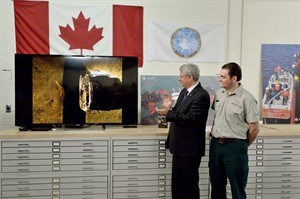
Prime Minister Stephen Harper applauses the find of a ship from Sir John Franklin's doomed 1846 Arctic expedition in Ottawa on Tuesday September 9, 2014.
Image Credit: THE CANADIAN PRESS/Sean Kilpatrick
September 10, 2014 - 7:29 PM
OTTAWA - There are few things that turn Stephen Harper's crank as much as Canada's North.
Since coming to power back in 2006, he has made a pilgrimage to the territories an annual rite. It's clear to anyone who has accompanied the prime minister on one of his northern tours just how much he truly enjoys being there.
That affinity was on full display Tuesday. Harper could barely contain his delight as he delivered news of the discovery of one of two lost ships from Sir John Franklin's doomed Arctic expedition.
To be sure, there's political gain to be found in the North. The discovery of either HMS Erebus or HMS Terror — the search team isn't sure yet which wreck they've found — is undoubtedly a good-news story for Harper after less-flattering coverage in recent weeks and months of the Senate scandal and the Conservative government's dogged refusal to call a national inquiry into missing and murdered aboriginal women and girls.
The find likewise allows Harper to claim Canada is asserting its sovereignty over its northern territory. Much has been made by the prime minister and others of Russia's military buildup in the Arctic. Harper himself has cautioned that Canada should not allow itself to grow complacent about its northern neighbour.
The Conservatives have made Arctic sovereignty a key theme since taking office. Harper recently told journalists aboard HMCS Kingston the Franklin search was part and parcel of asserting Canada's control over its North.
"It ultimately isn't just about the story of discovery and mystery and all these things," Harper said last month.
"It's also really is laying the basis for what's, in the longer term, Canadian sovereignty."
To Rob Huebert, an Arctic expert at the University of Calgary who came along on Harper's recent trip north, the Franklin search has more to do with Canadian nationalism than Arctic sovereignty.
"The discovery of two historical wrecks from the 1840s that sailed under the authority of Britain before Canada was even a state doesn't really extend our claims of control over the waters of the Northwest Passage," he said.
The discovery accomplishes two big things, Huebert added.
"The search for the Franklin allows us to have a metaphor as we develop technologies that do, in fact, allow us to asset better control over the region."
The find also helps cement a commitment to developing the North as part of Harper's legacy, he said.
"When the history books go back and say, 'OK, what happened under the stewardship of Prime Minister Harper,' I think one of the things that he wants, and I think one of the things that he deserves to have — regardless of all the criticisms over everything else — will be that he did in fact put in a much more rational and concrete governance system for the Arctic from the federal perspective."
The search for the lost Franklin ships neatly ties together Harper's overall northern strategy into a powerful metaphor, says Carleton University instructor Jeff Ruhl, whose research has focused on the Conservative government's efforts to nation-build in the North.
"Harper's use of Franklin has served as a way in which all the different elements of his northern agenda can be packaged in a singular thing," Ruhl said.
"Franklin has served the project in many ways as the symbolic manifestation of Harper's overall northern agenda."
But putting politics aside, those who know the prime minister say his fascination with the North — and the Franklin saga in particular — is palpable.
"It's not in a kind of a layman's or a casual observer's level of interest. It's someone who has bored down quite deeply into the history and is quite knowledgeable," said John Geiger, president of the Royal Canadian Geographical Society.
"He knows his stuff."
Conservative MP Peter Kent, a former minister of the environment, says Harper's fascination with the North does indeed seem to be genuine.
"I was with him when we announced the Naats'ihch'oh extension to the national park system in the Northwest Territories," Kent says, "and he was like a kid as he visited the area and saw the people and some of the great, spectacular topography."
Geiger got a rare glimpse of the prime minister letting his hair down aboard HMCS Kingston last month as it anchored off the shores of Pond Inlet on the northern tip of Baffin Island.
He was among the handful of guests invited up to the ship's bridge to join Harper and his wife, Laureen, in a lively discussion about this year's Franklin search.
Excitement was in the air. People were slapping each other's backs. At one point, Geiger broke out the scotch and proposed a toast.
But for all the exuberance on the bridge that August night, there was one thing about which Harper was adamant: they would find the Franklin ships.
"There was clear expectation," Geiger said. "When the prime minister looks at you intently and tell you there will be a Franklin find this year ... that definitely raised the bar for all of us."
Credit: CBC: The National
News from © The Canadian Press, 2014